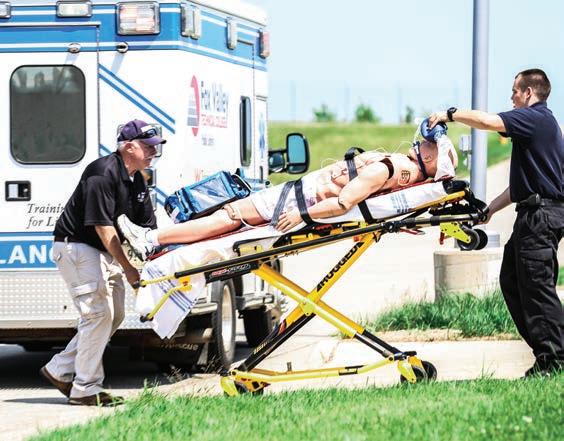
2 minute read
Health Science
Health Information Technology
10-530-1
Advertisement
Associate Degree•61 Credits•Financial Aid Eligible•Online
Time of Day: Day•Full Time
Want a career in the dynamic field of healthcare, but without the patient interaction? With this high-demand degree, you deal more with the patient's healthcare information than with patients. You’ll learn how to collect, code, manage and maintain the health data necessary for proper reimbursement, statistical and quality purposes. You’ll learn how to manage electronic health information in an electronic health record (EHR). You’ll train on current coding and chart management software and you’ll gain valuable field experience that will be helpful as you seek employment. Career
Technical Diploma•32 Credits•Financial Aid Eligible
Appleton, Oshkosh, Wautoma
Time of Day: Day and Evening•Full Time and Part Time
31-509-1
With this diploma, you become an essential part of the healthcare team. Your role is to take vital signs, assist the physician with examinations and minor office procedures, and administer medications. This career combines business and administrative duties with clinical laboratory functions.
You’ll learn the necessary office skills as well as specimen collection and basic lab tests. The program includes a supervised practicum experience, allowing you to apply what you’ve learned in a real-world environment.
Learn how you can get the hands-on skills for a rewarding career as a Medical Assistant: www.fvtc.edu/MAVideo
Technical Diploma•28 Credits•Financial Aid Eligible•Online
Time of Day: Day•Full Time
Medical coding specialists translate verbal descriptions of disease, injury and procedures into numerical designations. The accurate recording of this information is critical for the reimbursement of healthcare claims, medical statistics and research. You'll gain an understanding of the anatomy, signs and symptoms of diseases, and medical procedures. You'll also learn how to analyze medical records and assign codes to diagnoses and procedures. Upon completion, you could work in a variety of healthcare settings, for a health insurance company or continue on to the Health Information Technology Associate Degree. Career Opportunities
Medical Laboratory Technician
10-513-1
Associate Degree•64 Credits•Financial Aid Eligible•Appleton
Time of Day: Day•Full Time
Get the hands-on skills you need to become a medical laboratory technician. You’ll learn to perform routine clinical laboratory testing in hematology, clinical chemistry, immunohematology, microbiology, serology/immunology, coagulation, molecular and other emerging diagnostics as the primary analyst making specimen oriented decisions on predetermined criteria, including a working knowledge of critical values. Communication is vital in this career and you’ll obtain the skills needed for interaction with team members, external relations, customer service and patient education. Throughout your training you’ll also receive experience in information processing, training others and quality control monitoring.
Technologist
10-525-2
Associate Degree•60 Credits•Financial Aid Eligible•Appleton
Time of Day: Day•Full Time
The Neurodiagnostic Technologist program prepares you, under the supervision of a physician, to study and record electrical activity in the brain and nervous system for purposes of patient monitoring and supporting diagnoses in collaboration with the electroencephalographer. You’ll learn attributes and skills to obtain interpretable recordings of patients' nervous system function. You’ll become skilled in the following areas: communicating with patients, family and other healthcare personnel; taking and abstracting histories; applying adequate recording electrodes and using electroencephalography (EEG), evoked potential (EP), nerve conduction studies (NCS) and polysomnography (PSG) techniques; documenting the clinical condition of patients; and understanding and employing the optimal use of EEG, EP, NCS and PSG equipment, and data recording and documentation. This program includes a supervised practicum experience in a clinical setting while you are enrolled in the program.
Career








